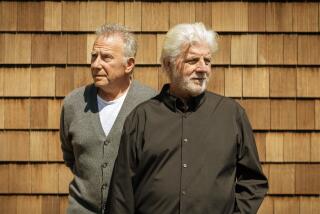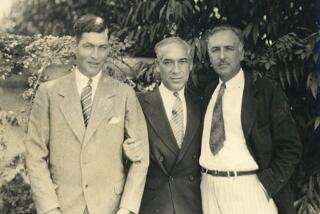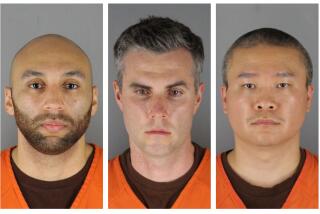Floyd’s Rise From the Ashes
- Share via
AUGUSTA, Ga. — Their house--their home , Maria Floyd quickly corrects you--was one of those mansions that many of us see only in the movies or with a guided tour, not exactly Xanadu but guarded and gated, with a backdrop of the deep-blue sea. When they threw a party, as the Floyds often did, there were plenty of spaces for cars to park, as well as plenty of valet attendants to do the parking.
As for the house itself, yes, its 12,000 square feet were richly furnished, worthy of being photographed for Architectural Digest. There was more than enough creature comfort for Raymond and Maria, their three teen-age children, their pet parakeet and their live-in housekeeper Aurelia Kaselin, who watched over the family with the attentiveness and affection of a loving relation.
In the pre-dawn hours of Feb. 19, it was Aurelia who noticed the smoke.
She turned in her bed and looked out her sliding-glass window toward the patio. It was approaching 4 a.m. there on Indian Creek Island, overlooking Biscayne Bay in the solitude a few miles removed from the neon night life of Miami Beach. Rubbing the sleep from her eyes, Aurelia took a second look and saw the plume of flames, through the open screen heard the crackle.
The housekeeper awakened Maria Floyd, then called the fire department while Maria roused the kids, rushing to each of their bedrooms before any of them could be startled by the fire engine’s sirens. Aurelia unhooked the latch on the cage to rescue the parakeet. Then they glanced around, quickly, to see if there was anything they could grab on their way out the door.
Three thousand miles away in San Diego, where Raymond Floyd would be participating that weekend in the Buick Invitational at Torrey Pines, the telephone pulsed. He remembers focusing on the clock, memorizing the time: 1:08. The only thing he knew for sure is that nobody from the East Coast would be up and calling him at that hour.
He was wrong. Maria told her husband that everybody was safe but that their dream house, their home of 14 years, was afire.
“How much damage?” Raymond asked.
“I can’t tell yet,” she said. “The roof’s fallen in.”
An hour and a half later, the fire fighters were still aiming their hoses at the blaze. The mansion’s foundation was cement, many of its floors and walls were tile or marble, all of which was a blessing. But the interior of the house was completely gutted, including the possessions, both valuable and sentimental, of everyone who lived there. And the photographs, the mementos, the trophies from Raymond Floyd’s 30 distinguished years of professional golf . . . gone, just like that.
Unable to bear watching any more, Maria packed everyone into the family station wagon and pulled away, the children looking over their shoulders at what was left of their home. And looking back now, weeks later, gets harder and harder to do.
“ ‘House’ is not the right word. It was our home,” Maria says. “It was the base for our whole life. All of our family’s memories were there. We woke up one morning and it wasn’t there any more.”
She and Raymond prided themselves that, while work and skill and luck had provided them with uncommon luxury, their home was one where friends could feel comfortable kicking their shoes off, propping their feet up, coming around for the yearly soiree the Floyds would throw in conjunction with the PGA’s most convenient stop, the Doral Ryder Open in Miami. To them, their house wasn’t state of the art; it was state of the heart.
They were looking forward to another Doral, one that would be beginning in nine days. The party invitations already had been sent out. And anybody who didn’t receive one, well, drop by anyway.
Raymond Floyd was in no mood for a party by the time he got home. He was in no mood for golf, either. This was to be his final full year on the PGA Tour, what with his 50th birthday coming up in the fall. Although he felt too fit and too young to be playing on some “Senior” tour with a bunch of bogeying fogies--this was his running joke around the house, at least--Floyd never felt older, never felt less like starting fresh than when he returned home from San Diego to a pile of black ash.
“You feel so violated,” he said.
It was something you read about, something you see on the TV news. Floyd remembers reading about the time when the valuables and keepsakes of basketball’s Kareem Abdul-Jabbar were wiped out by fire. Now he knows first-hand what that was like, and says: “Except for the people themselves, your family, your neighbors, it’s the most devastating thing in the world, losing the personal things that mean so much to you.”
Maria persuaded him to play golf, give his mind a rest. Reluctantly, he did. He entered the Doral, with its $150,000-plus first prize. Was he too distracted to play well? To have a chance to win? No. He won.
“I can’t sit here and tell you that circumstances drove me to what I did,” Floyd says. “That would be a lie. But maybe I concentrated a little harder than normally. I’ll never know.”
Raymond Floyd is among the leaders here at the Masters, going into its final day. At 49, he would become the oldest golfer to win the tournament, the oldest to win any Grand Slam tournament, and he says the Senior Tour will have to do without him for a while, 50th birthday notwithstanding. The fire that pained him so has been extinguished. The competitive one inside him has not.


